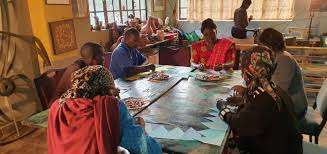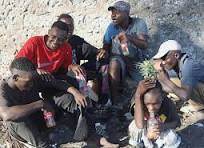HOW MENTAL HEALTH IS AFFECTING MOST OF THE LEARNERS IN OUR COMMUNITY
BEHIND THE SMILE
Every morning, 11-year-old Mutua walked into school with a smile on his face. He was the kind of child teachers loved—quiet, respectful, and always finished his homework on time. To his classmates, he seemed calm and composed, the boy who never caused trouble. But what no one knew was thats Mutua' smile was a mask he wore every day to hide what he was truly feeling.
At home, things were difficult. His parents fought often, sometimes over money, sometimes over nothing at all. The house, once filled with laughter and bedtime stories, had turned cold and silent.a to Mutua young to understand all the complexities, simply felt the weight of it all pressing on his small shoulders. He began to feel anxious all the time—his stomach would hurt before school, and he’d often get headaches, but he told no one. He didn’t want to be a burden.
Over time, mutua sparkle began to fade. He stopped joining in games during recess. He became more withdrawn in class. His teachers noticed the changes but assumed he was just going through a “quiet phase.” After all, his grades were still okay.
Until one day, Mutua broke down in the school library. The librarian, Mrs. musyimi found him hiding between the shelves, tears streaming down his face. Gently, she knelt beside him and asked, “What’s wrong, Mutua?” It was the first time in months that someone had asked—and truly meant it.
That moment opened a door.
With the help of Mrs. Musyimi and the school counselor, Mutua slowly began to talk about what he was going through. He was introduced to breathing exercises to calm his anxiety. He was encouraged to draw and write as a way of expressing his emotions. Most importantly, he was made to feel that he wasn’t alone—and that his feelings were valid.
His teachers were looped in, and they made small changes—checking in with him often, giving him space when he needed it, and even starting morning “feelings check-ins” for the whole class. These small acts made a big difference. Mutua began to feel lighter, more understood. He began to smile again—not the fake one, but a real one.
Why This Story Matters
Children like Mutua are everywhere. Many wear invisible masks every day—masks that hide fear, sadness, and confusion. Mental health challenges don’t always look like loud outbursts or failing grades. Sometimes, they look like silence. Like perfect homework. Like fake smiles.
As parents, educators, and communities, we must learn to look beyond the surface. We need to create safe spaces where children can talk without fear of being judged or ignored. Schools should prioritize mental well-being just as much as academics. And children must be taught early that it’s okay to ask for help.
Mental health is not a luxury—it’s a necessity. For every child.
WOW!!!! LETS FOCUS NOW ON SOME OF THE FACTORS WHICH MY SHOW UP IN MENTAL HEALTHY OF THE LEARNERS.
SINGS OF THE LEARNERS WHICH ARE AFFECTED BY MENTAL HEALTH
1. Emotional Signs
-
Frequent sadness, tearfulness, or emotional outbursts
-
Excessive worry, fear, or anxiety
-
Low self-esteem or feelings of worthlessness
-
Mood swings or irritability
-
Withdrawal from friends, family, or social activities
some of the example of the learner affected emotionally
2. Behavioral Signs
-
Sudden changes in behavior or personality
-
Difficulty concentrating or staying focused
-
Lack of motivation or interest in learning
-
Risk-taking behaviors or aggression
-
Skipping classes or avoiding school
3. Physical Signs
-
Fatigue or lack of energy
-
Changes in appetite or weight
-
Sleep problems (insomnia or oversleeping)
-
Unexplained aches or frequent complaints of illness
-
Poor personal hygiene or grooming
4. Academic Signs
-
Drop in academic performance
-
Missed assignments or poor time management
-
Difficulty remembering or processing information
-
Avoidance of tasks that require concentration
-
Frequent requests to leave class or go to the nurse
5. Social Signs
-
Difficulty making or keeping friends
-
Isolation or social withdrawal
-
Conflict with peers or teachers
-
Reluctance to participate in group work






very nice work brother
ReplyDelete